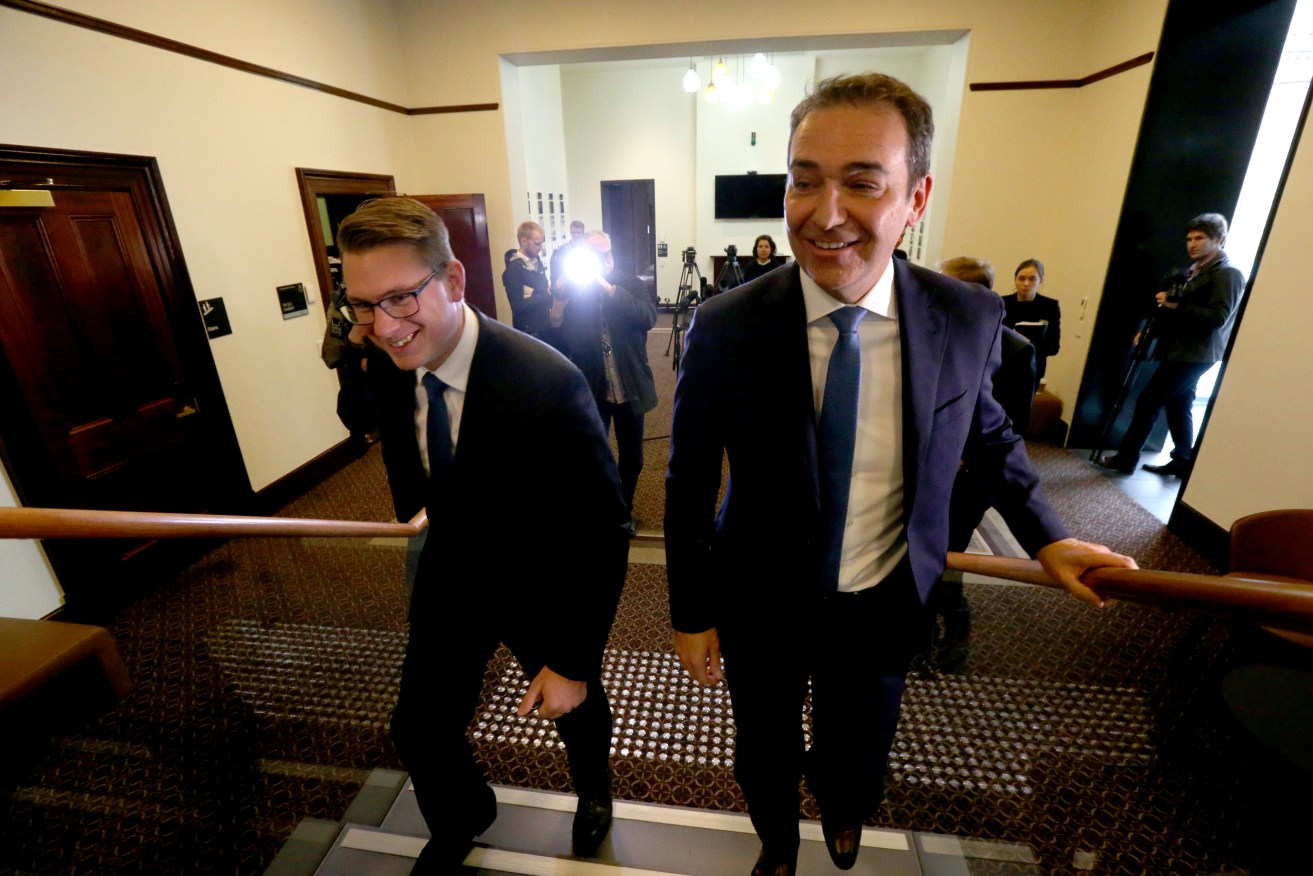New probe into council spending to push reforms
EXCLUSIVE | Local government spending, council conduct and transparency will be put under the blowtorch, with the Marshall Government establishing an independent inquiry by the state’s Productivity Commission.

Local Government Minister Stephan Knoll with Premier Steven Marshall. Photo: Kelly Barnes / AAP
It’s the second inquiry the Government has directed the commission to undertake since its establishment last year, with a review of state government procurement practices still ongoing after its scope was broadened.
It follows several months of sustained controversy over allegations of council expenditure and conduct, including media and community disquiet over Onkaparinga’s use of ratepayer-funded credit cards, an ongoing ICAC evaluation of Playford’s governance framework and a failed State Government push to cap council rate rises.
That failure prompted Local Government Minister Stephan Knoll to seek wholesale reform of the Local Government Act, with submissions for the review closing earlier this month.
Now, though, the Government has gone a step further, establishing a forensic inquiry whose findings “will help inform the State Government’s Local Government Reform Program”.
Premier Steven Marshall told InDaily in a statement his Government was “committed to easing cost of living pressures on South Australian families and businesses across the state”.
“That’s why we are now establishing this Productivity Commission inquiry to determine how changes in the efficiency of local government spending may result in a noticeable decrease in costs for council ratepayers,” he said.
“Local government spending has a real impact on the day-to-day lives of residents, so it’s critical councils get it right to ensure the best outcomes for their community.”
The Local Government Association has backed the probe, with president Sam Telfer telling InDaily:“We look forward to participating in the inquiry, and hope it will help identify positive opportunities to support continued improvement in the sector and drive downward pressure on council rates.”
“It is important that through the reform process we develop meaningful, long-lasting changes that will serve our communities and councils,” he said, noting it was “encouraging to see the Government taking an evidence-based approach to local government reform”.
“We’ve worked with our members to identify a range of potential reforms, with sector-wide benchmarking a significant opportunity to further improve transparency, and drive efficiencies.”
Those potential reforms are detailed in the LGA’s own submission to Knoll’s policy review, which has been obtained by InDaily.
The document recommends strengthening the Code of Conduct for council members and electoral reforms including electronic voting in local government elections, the introduction of casual vacancies rather than supplementary elections and enforced leave – including the suspension of allowances – for council members standing for state or federal elections.
It also advocates audit committee reform and the introduction of lodgement fees for ‘section 270 complaints’ about the actions of a council or councillor – which the LGA says is a significant impost on council resources.
The fee would be refunded if the complaint is upheld.
Local Government Minister Stephan Knoll said the blockage of his rate-capping Bill made it “crucial that we proceed with this Productivity Commission inquiry which will run side by side with our broader local government reform process this year”.
The report, expected to be published by the end of the year, will examine “stronger council member capacity and better conduct, efficient and transparent local government representation, lowering costs and enhanced financial accountability in the sector and simpler regulation”.
Productivity Commission CEO Dr Matthew Butlin said the reviewers were “not going in with any preconceived ideas driven by recent or not-so-recent instances” and the inquiry would not focus on any specific high-profle cases.
“That’s not what we’re dealing with,” he told InDaily.
“What we’re dealing with is the objective information about where councils spend their money, or where they incur their costs… with a population of 68 councils with quite different sizes, you’d expect to see quite wide variation.”
He said the review was an “analytic and fact-finding analysis of the councils’ cost base and the drivers that affect that”.
“We have to be extremely careful with this work… it’s quite pain-staking work [and] we don’t have any preconceived ideas,” he said.
“The first big task is to understand what the cost base is and what are the things that drive that… it’s important we work with organisations like the LGA and councils themselves, to the extent they feel they can [because] this sort of work provides benefits to them.”
Consultant and former Marion and Onkaparinga CEO Jeff Tate has been appointed as a part-time commissioner for six months to help oversee the inquiry.
Professor Christopher Findlay has also been appointed to the commission for a three-year term following the recent death of former Essential Services Commissioner Professor Paul Kerin.
Want to comment?
Send us an email, making it clear which story you’re commenting on and including your full name (required for publication) and phone number (only for verification purposes). Please put “Reader views” in the subject.
We’ll publish the best comments in a regular “Reader Views” post. Your comments can be brief, or we can accept up to 350 words, or thereabouts.
InDaily has changed the way we receive comments. Go here for an explanation.




